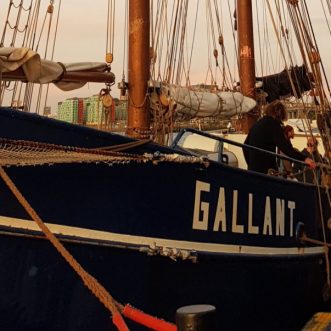
Shopping
Yesterday evening I picked up my second ever online grocery order from Greenwich Pier. It was more expensive than buying the same stuff from Ocado, but not eye-wateringly so.
What I bought:
- Coffee beans, chocolate, olives with lemon, olives with garlic, almonds and honey.
- A contribution to the restoration of the Raybel – a historic Thames barge that will be used in future drop-offs along the Thames.
- Support for small, organic growers and producers across Europe and in South America, so they can carry on treating their land, their crops and their people right.
- A contribution to another income stream for the schooner Gallant and other ships like her, so that more people can enjoy sailing in her, and more people can buy goods shipped by her.
- Support for New Dawn Traders and the Sail Cargo Alliance they are part of.
- A contribution to another way of doing things.
We waited, in the open air for a good 10 minutes before my shopping arrived – far longer than I’ve ever waited at my favourite bugbear, the supermarket checkout – but I didn’t mind. Funny that.
We never buy ‘just stuff’. We buy what we think it means for us. Sometimes what we think it means and what it actually does are the same thing.
And that makes us ‘consumers’ more powerful than we realise.








